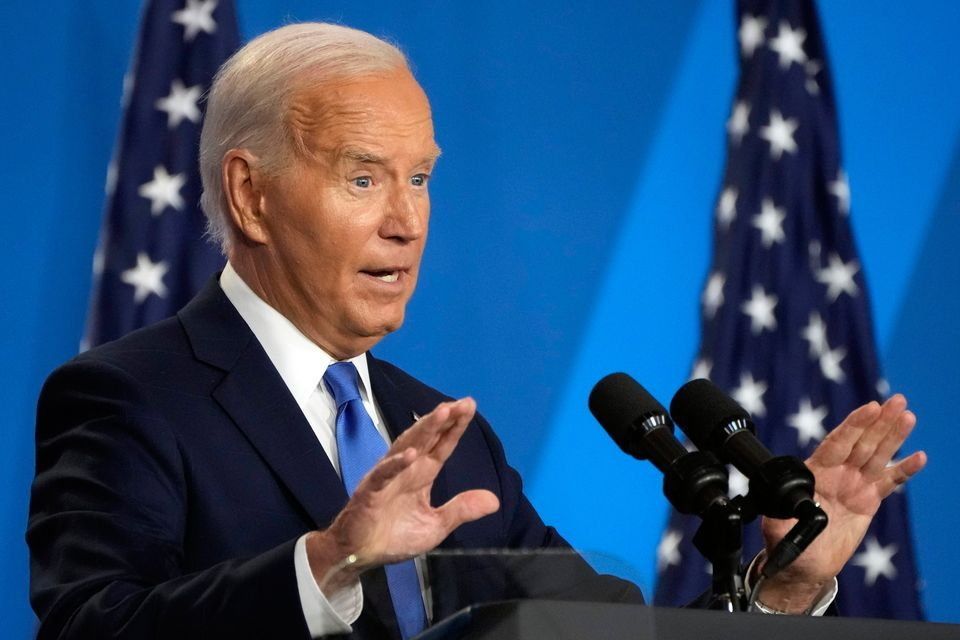
For Ukraine there is security only in NATO. Laying the foundation for this could be the American president’s legacy.
After a one-week delay, Joe Biden is coming to Berlin on Thursday and Friday for the first state visit by an American president in Germany in almost 40 years. This unwavering trans-Atlanticist has been a godsend for the West’s cohesion to this day. He only has three months left in office. But Biden seems determined to make use of this brief time — not so much for farewell celebrations, but for decisions that are yet to be made. Of course, he is also concerned with his legacy.
International policy is his major subject. He has dedicated himself to it with all his passion since he was elected to the Senate for the first time in 1972. That’s why it’s fitting that the brief state visit to Germany is ultimately a working visit. Because Biden is stepping aside in a world torn apart by war.
As a result of the war in Ukraine and the violence in the Middle East, a feeling of helplessness and defenselessness is growing among many people. Worldwide upheaval is too threatening. A recently published report by the Commission on the National Defense Strategy shows that this fear is not unfounded. In it, Democrats and Republicans agree: “The threats the United States faces are the most serious and most challenging the nation has encountered since 1945 and include the potential for near-term major war.”
As if the present were not bad enough. In the merciless Ukrainian war of attrition, President Volodymyr Zelenskyy and his troops are on the defensive. Vladimir Putin’s army is advancing, slowly, mile by mile. Russia’s president seems prepared to pay any price for even the smallest territorial gains. It is estimated that six Russian soldiers have been killed for every one Ukrainian soldier killed. In total, it is estimated that almost 100,000 Russian soldiers have lost their lives and more than 400,000 have been wounded since the beginning of the war.
Putin shows no interest in peace negotiations. Why should he speak with the countries of the West? “The point is not that they are helping our enemy. They are our enemy,” he said at a visit to a military hospital on Jan. 1, 2024.
Military and Financial Aid Alone Will Not Be Enough
When Sahra Wagenknecht’s future coalition partners in Thuringia, Saxony and Brandenburg bow down to the Sahra Wagenknecht Alliance and demand “more recognizable diplomacy” from the federal government, they are directing their demand to the wrong address. The right one would be Putin’s. But he is not thinking about a cease-fire. He is counting on the exhaustion of Ukraine and war fatigue in the West. He rebuffed the chancellor, who tried to call him. With Biden, he would probably pick up the phone.
Once again, it’s up to the United States. Biden knows his responsibility. When Zelenskyy visited him in Washington three weeks ago, Biden assured him of further military aid amounting to $8 billion until the end of his term in office.
However, military and financial aid will not be enough. The West must offer Ukraine a political prospect. And based on the state of things, that can only be NATO membership. As far as is known, the desire for admission to the Atlantic alliance belongs to Zelenskyy’s “peace plan.”
Mark Rutte, the new secretary-general of NATO, said during his visit to Kyiv two weeks ago: “Ukraine is closer to NATO than ever before. And will continue on this path until you become a member of our Alliance.”
In fact, admission into the alliance is the most impactful guarantee of security the West has to offer Ukraine. It is not possible to join in the middle of war. But a firm commitment can and must be made now.
There is no more reliable protection against threats of state security than strong alliances. Nobody knows this better than Biden, who re-strengthened America’s alliances after Donald Trump’s destructive presidency. Laying the foundation for Ukraine’s admission into NATO would be an impressive legacy with which Biden can exit the world stage.

Leave a Reply
You must be logged in to post a comment.